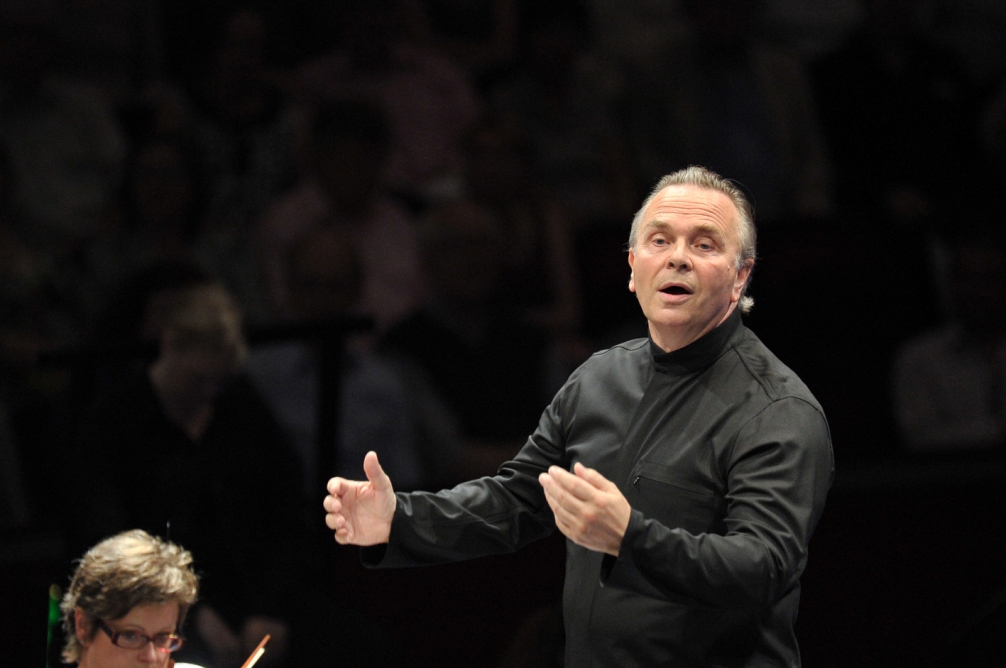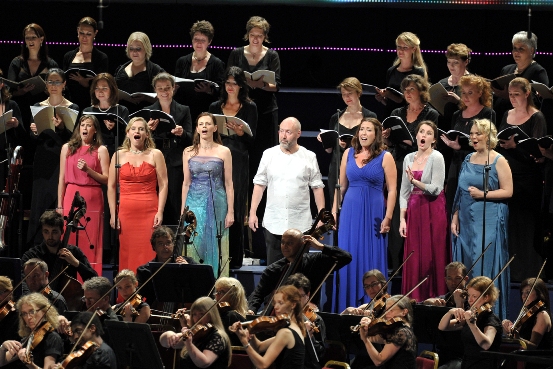So for one last time this season the impossible colosseum of Albertopolis became the Wagnerian holiest of holies – to be precise, the Cathedral of the Holy Grail - and once again I fell in love with the beast transfigured. Justin Way, the one artist common to all seven Wagner operas as their subtle semi-stager, should be the delegate to receive the award the Proms deserve for highest achievement of bicentenary year; and it seemed right to have Sir John Tomlinson, albeit by dint of another bass’s indisposition, giving his benediction as the witness of a final miracle.
No mere ghost of Wagnerian excellence past, this Gurnemanz; you always fear imminent heart-attack under pressure, but that’s been the case for years now, so pray for his continuing health as a long-life bass (they’re the lucky ones in terms of longevity). By the third act even this titan was flagging; but the pressure of emotion continued to carry it through. One of the pleasures for me of the Proms Wagner performances I count myself hugely privileged to have witnessed has been to discard the printed libretto-translation – still no supertitles for the Royal Albert Hall – and see how much meaning comes across. And with Tomlinson, it was effortlessly projected with physical ease and powerful gestures; vital since Gurnemanz is the chronicler of the brotherhood of the grail’s decline and its search for salvation in the shape of the pure fool made wise through compassion.
No-one was going to believe, outwardly at least, in Wagnerian veteran Lars Cleveman's Parsifal as a confused stripling, but he too left us in no doubt of a soul in search of enlightenment. The tenor voice is light-ish, like Robert Dean Smith’s in the Proms Tannhäuser and Tristan, but Cleveman is capable like Smith of staying the course and pulling out the stops, if not the darker colours ideally needed for Parsifal’s Act Three transformation as a knight of endless suffering.
 Total assumption of the evening, though, was Katarina Dalayman’s as Kundry the undead (where was she last Thursday when we needed an idiomatic Wagnerian soprano for the Wesendonck Lieder?) Refusing to abet Wagner’s ridiculous scenario, as in Tannhäuser, of sanctity equals good, sensuousness bad, she settled neither for pure penitence on the one hand and evil voluptuousness on the other but served up a woman of infinite variety. Way’s staging allowed us to chart her few-notes presence in Act One and her even more silent role in Act Three (Kundry, having been through the vampy mill once more as magician Klingsor’s seductress, returns to deracinated Montsalvat to see and understand; she sings only two words, or rather one repeated: “dienen, dienen” – “to serve”). How deeply moving this was, the Magdalene at Parsifal’s feet, the despairing Gurnemanz hardly able to believe his eyes, Cleveman’s stricken wanderer absolutely still between them.
Total assumption of the evening, though, was Katarina Dalayman’s as Kundry the undead (where was she last Thursday when we needed an idiomatic Wagnerian soprano for the Wesendonck Lieder?) Refusing to abet Wagner’s ridiculous scenario, as in Tannhäuser, of sanctity equals good, sensuousness bad, she settled neither for pure penitence on the one hand and evil voluptuousness on the other but served up a woman of infinite variety. Way’s staging allowed us to chart her few-notes presence in Act One and her even more silent role in Act Three (Kundry, having been through the vampy mill once more as magician Klingsor’s seductress, returns to deracinated Montsalvat to see and understand; she sings only two words, or rather one repeated: “dienen, dienen” – “to serve”). How deeply moving this was, the Magdalene at Parsifal’s feet, the despairing Gurnemanz hardly able to believe his eyes, Cleveman’s stricken wanderer absolutely still between them.
Vocally, Dalayman was perfect. Mezzo, even contralto, chest voice connected to the rest; the middle range is pure Wagnerian-soprano gold and the top was fearless, and fierce in her Act Two desperation, where she changed before our eyes from poised diva in shimmering evening wear to a soul in hell.
 But no Parsifal is going to succeed merely through individual performances; its religious ritual must convince. Sir Mark Elder’s control of the light within his excellent Hallé Orchestra and the absolute synchonicity of onstage knights – the Royal Opera Chorus, swelling to spine-tingling, tear-jerking effect – with “youths” above in gallery east and boys to the north (Trinity Boys’ Choir and Hallé Youth Choir, absolutely superlative) made the grail ceremonies more elevating than any I’ve previously heard. I have no issue with Elder being slower than most when Wagner simply writes “sehr Langsam”, but I do wish he’d sometimes be a bit more impetuously dramatic in the action-rushes. The model of Sir Reginald Goodall he so admires is fine for symphonic cohesion, but not always for music-theatre.
But no Parsifal is going to succeed merely through individual performances; its religious ritual must convince. Sir Mark Elder’s control of the light within his excellent Hallé Orchestra and the absolute synchonicity of onstage knights – the Royal Opera Chorus, swelling to spine-tingling, tear-jerking effect – with “youths” above in gallery east and boys to the north (Trinity Boys’ Choir and Hallé Youth Choir, absolutely superlative) made the grail ceremonies more elevating than any I’ve previously heard. I have no issue with Elder being slower than most when Wagner simply writes “sehr Langsam”, but I do wish he’d sometimes be a bit more impetuously dramatic in the action-rushes. The model of Sir Reginald Goodall he so admires is fine for symphonic cohesion, but not always for music-theatre.
Still, the malevolent prelude to Klingsor’s magic garden, soon abetted by Tom Fox’s impassively evil magician, suitably surged, and the agony of the incurable wound Amfortas received there had suitable intensity in the acting, if not entirely the lightish and not exactly distinctive baritone voice, of Detlef Roth, a later replacement than Tomlinson. His enactment of the grail ritual, arms held aloft (qi gong training?), very much helped us to believe in its supernatural quality.
 Among the squires, Joshua Ellicott projected a bigger tenor voice than his light-lyric repertoire to date might suggest – a Heldentenor in the making? – and the Flower Maidens who toy with Parsifal in the magic garden (pictured right with Cleveman) were playful though hardly sensual, abetted by floral luminescence on the ever-useful back screen.
Among the squires, Joshua Ellicott projected a bigger tenor voice than his light-lyric repertoire to date might suggest – a Heldentenor in the making? – and the Flower Maidens who toy with Parsifal in the magic garden (pictured right with Cleveman) were playful though hardly sensual, abetted by floral luminescence on the ever-useful back screen.
Did I believe in the final tableau, “Our Redeemer redeemed”? Not entirely – Wagner always seems happier in a state of irresolution rather than apotheosis, and the music tells us nothing more than it did in Act One – but the inwardness of the orchestral playing went as far towards conveying the metaphysical as we’re likely to get. Besides, it was the only possible conclusion to a magnificent Wagner sequence at the Proms which will remain among the lifelong highlights of anyone lucky enough to catch all, or some, of it live.














Add comment